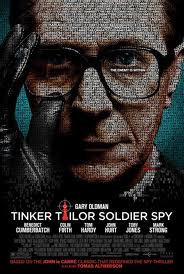It is a tricky thing to take an enormously popular novel, first turn it into an enormously popular British mini-series with Sir Alec Guinness no less playing George Smiley the hero, and then try to do a whole new take on it with a whole different set of actors 30 years later on the silver screen. On top of that, the movie tries to do in 2 hours and a bit what the mini-series did in six parts of 50 some minutes each. And I am here to say that both are successful. What are the pluses and minuses?
Both the mini-series and the movie major in cloak and dagger atmosphere. Shadows, night time, string music in minor keys played to the hilt, furtive persons running hither and tither, secret code languages, sarcasm, the loss of innocence, the real spy stuff, not to be confused with James Bond. And both versions successfully capture the paranoia and secret services in the Cold War, especially of course the British secret service. It’s hard to find likable characters on either side of the Maginot line in these presentations, with the possible exception of Smiley himself.
In regard to the current movie, it deserves all the Oscar nominations it gets. John Hurt is great as the wasted Control losing his grip. Colin Firth is equally great as the rotten apple in the barrel called the Circus. Benedict Cumberbatch sporting blond hair is fine as Peter, the helpers of Smiley. But the real star turn and Oscar worthy performs is by the magnificent Gary Oldman, who should finally get his Oscar due this time. He is amazing to watch in this film, and completely convincing, big glasses and all.
The strength of the mini-series is that you get more breadth and depth, more important dialogues, more clues to unraveling the mystery of who is the mole. But what you gain on the straight away of the mini-series you lose on the roundabout. By this I mean, the movie is much tauter, the action more viseral and compelling, less chance to get lost in the tittle tattle and obscure allusions. And of course the cinematography is miles better in the movie than in the 1970s era mini-series even with remastering.
One of the crucial lessons of both versions of the story is that when one gives up on truth, loyalty is the only currency that counts. And when one then betrays even loyalty, well, then you are lower than the lowest– the off scouring of the earth. There is much to admire and much to despise. Neither version makes one want to be a spy or in the secret service. And neither one presents ‘Russia with love’.
It is a shame that the movie has come out in such limited release, and often in art theaters. It deserves better. So if you have a chance to go see it, by all means do so. Tell them George Smiley sent you to check things out, and the password is Gerald.













